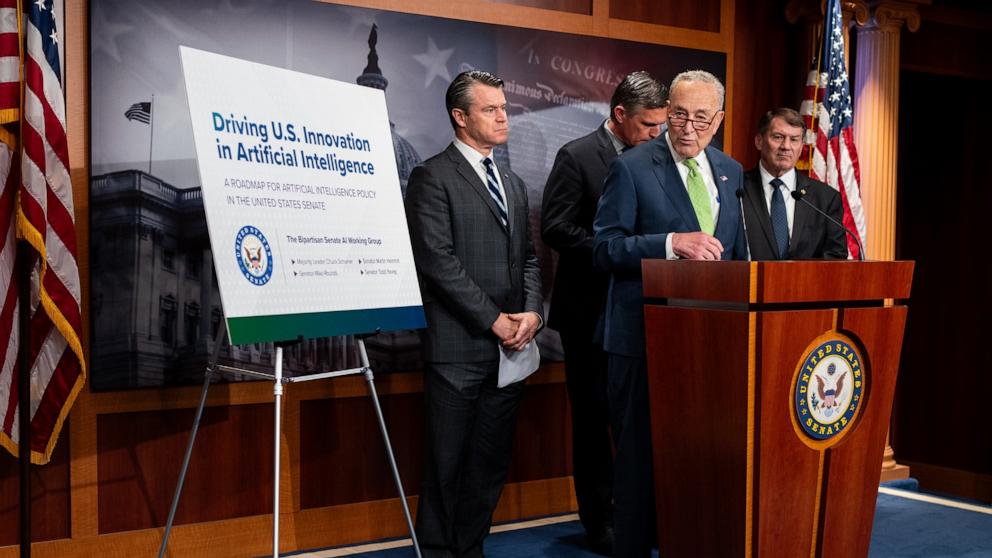A bipartisan group of senators led by Majority Leader Chuck Schumer on Wednesday released a “roadmap” for lawmakers aimed at guiding Congress on regulating artificial intelligence.
They said the recommendations are an important step as Congress considers legislation to encourage innovation and prevent negative uses of rapidly evolving technology.
The document calls for a significant increase in funding for AI innovation in Congress's annual funding process, providing $32 billion in funding over several years, but this does not cover national security concerns related to artificial intelligence. This is the amount recommended by the committee.
Schumer said in a press conference that the funding will help “solidify America's lead in AI.”
Schumer said other funds, likely billions of dollars in the future, will also be needed to address defense and national security concerns related to artificial intelligence.
“Congress had to make a critical choice: stand by and watch AI reshape the world, or make a serious new bipartisan effort to harness and regulate this industry,” Schumer said. he said. “We knew that if we did nothing, there could be practical problems in that we wouldn't be able to maximize the benefits of AI and we wouldn't be able to minimize the drawbacks of AI.”
He said he aims for the effort to be bicameral as well as bipartisan, and said he plans to meet with House Speaker Mike Johnson soon to discuss AI policy. Schumer said he thinks Johnson is “very interested” in moving forward.
The senators' working group has focused on artificial intelligence in recent months, with Schumer, Sens. Todd Young (R-Ind.), Mike Rounds (R.D.), and Martin Heinrich (D.N.) .M.) is participating.
Before announcing the Roadmap on Wednesday, the group held a series of AI Insights Forums over the past few months, attended by some of the biggest names in the technology world and many industry players. Across nine forums he was attended by over 150 experts.
The document is the end result of that work. Although it does not contain legislative text, it is intended to inform lawmakers as they continue to explore the best ways to pass legislation to reign in the field of artificial intelligence. Senate committees have held hearings on a number of AI topics relevant to their respective committees, and this document encourages the continuation of those discussions.
“We always knew we had to go to committees to get something concrete done, and AI has so many different facets in so many different areas that it took a lot of committees to get it done.” “We're going to need that,” Schumer said. “We are now very hopeful that the bipartisan momentum we have fostered and the recommendations we have made will extend to the committee and its process.”
There are a huge number of policy priorities the committee could address, and Schumer said he expects AI-related legislation to be approved by the Senate before the end of the year. Schumer said the Senate will advance AI legislation as soon as it's ready and won't wait for a big AI bill to be voted on all at once.
In a major boon to that effort, the Senate Rules Committee on Wednesday announced a new bill to ban elections from the challenges posed by artificial intelligence, including a bill that would ban the use of AI to generate “grossly deceptive content” depicting the federal government. We have introduced several bipartisan bills aimed at protecting the United States. candidates.
These so-called “deepfakes” are the focus of a bipartisan report released Wednesday. In addition to supporting efforts to regulate false election content, the senators also acknowledged the need to regulate the destruction of “nonconsensual” and “intimate” AI-generated images. The issue gained particular attention in January when explicit AI-generated images of Taylor Swift surfaced on the internet.
In their report, the senators will discuss how to create a federal data privacy framework, how to lead the adoption of these new technologies in a way that strengthens national security, and how existing regulations for AI should be strengthened. He also emphasized the need to consider ways to ensure that the law is fully implemented. .
They were also said to be excited about the transformative potential of AI. Young and Rounds both emphasized the impact that artificial intelligence will have on treating diseases such as cancer and Alzheimer's disease, and urged Congress to invest in innovative technologies to avoid burdening taxpayers with future health care costs. said it was necessary to do so.
“Imagine a world where cancer, Alzheimer's disease, and other deadly diseases are cured in just a few years,” Young said. “Imagine a world where governments could become so much more efficient that they could actually find ways to dramatically reduce health care costs.”
The senators also say it's important for Congress to consider growing concerns about the impact of AI on workers, including the potential for workers to be displaced by artificial intelligence. They encourage lawmakers to work with unions and stakeholders across civil society to ensure that workers are trained and retrained to work with AI, rather than being displaced by it. ing.
No major legislation to regulate AI has yet passed Congress. While there is some evidence of bipartisanship in early efforts, it is not yet clear what kind of support large-scale regulatory efforts will ultimately receive.


